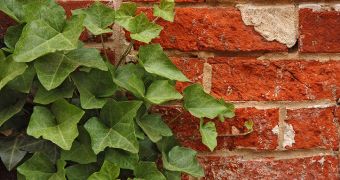It's commonly accepted that ivy destroys walls. This idea has been passed on from generation to generation, perhaps through books dealing with the old days, and from parents to children. However, a new study from the Oxford University demonstrates that this is not true. Just the opposite, researchers here say. It would appear that the hanging plant is capable of protecting old walls against their most feared enemies – large temperature fluctuations. These events promote the appearance of cracks in the stones, causing them to eventually fall apart. Ivy acts as a thermal insulator, preventing this from happening, ScienceDaily reports.
The new study took three years to complete, and it analyzed ivy growing on brick walls at five locations throughout the United Kingdom. The results were the same at all the test sites – the plant is actually protecting the structures, not damaging them. The investigation was ordered by the organization English Heritage, which is in charge of handling hundreds of historical buildings and other sites. Its representatives enlisted the help of Heather Viles, who is a professor at the Oxford School of Geography and the Environment. The target of the research was the common ivy species Hedera helix.
The reason why the scientists selected more places is because these locations had varying climates, which allowed them to study the plant in a wide array of weather conditions. It was discovered that, during the cold months, ivy kept the walls about 15 percent warmer than their surroundings. During the summer time, the bricks were about 36 percent cooler than uncovered areas of the same wall. This translates into the fact that covered structures tend to exhibit less variations in temperature, which means that the materials within dilate and contract less. Such walls can be expected to have a longer life span than those left exposed to the elements.
“Ivy has been accused of destroying everything in its path and threatening some of our best loved heritage sites. Yet these findings suggest that there are many benefits to having ivy growing on the wall. It not only provides colorful foliage but also provides walls with weather-proofing and protection from the effects of pollution,” the team leader explains. “English Heritage are always keen to avoid unnecessary work to monuments and hope this research will lead to a more balanced approach to ivy. Removal should not be automatic as so often in the past, but a carefully considered element of long term management,” concludes English Heritage senior landscape manager Alan Cathersides.

 14 DAY TRIAL //
14 DAY TRIAL //